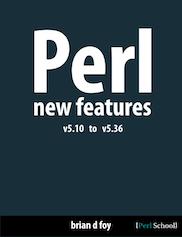 This is a chapter in Perl New Features, a book from Perl School that you can buy on LeanPub or Amazon. Your support helps me to produce more content.
This is a chapter in Perl New Features, a book from Perl School that you can buy on LeanPub or Amazon. Your support helps me to produce more content.
Perl’s coterie of brace constructs become a bit more lenient in v5.34. These things appear in double-quotish constructs, such as \N{CHARNAME} to specify a character by name. And, patterns count as a double-quoted construct (unless you use ' as the delimiter), so these new rules apply to brace constructs such as \k{} (for named backreferences) and the general quantifier, {n,m}.
Specifying characters
These constructs apply to double-quotish interpretation to specify a character by its codepoint or name:
| Construct | Description/th> | Item |
|---|---|---|
\N{CHARNAME} |
Character name | item |
\o{177} |
Octal code point | item |
\x{ABCD} |
Hex code point | |
There are already loose names for \N{} that ignores whitespace (item), but this feature is a bit different. It ignores horizontal whitespace around a value (but not inside a value):
use v5.10;
use open qw(:std :utf8);
say <<~"HERE";
Cat face: \N{ BLACK SPADE SUIT }
Octal: \o{ 23140 }
Hex: \x{ 2660 }
HERE
This outputs the character we expect:
$ perl5.34.0 whitespace.pl Spade suit: ♠ Octal: ♠ Hex: ♠
If you add space within the value, you don't get the character you want (the \N{} will actually fail):
use v5.34;
use open qw(:std :utf8);
say <<~"HERE";
Octal: \o{ 231 40 }
Hex: \x{ 26 60 }
HERE
This discards the cruft once it encounters non-digit characters (just like Perl's string-to-number conversions). This is effectively:
use v5.34;
use open qw(:std :utf8);
say <<~"HERE";
Octal: \o{ 231 }
Hex: \x{ 26 }
HERE
It's even worse. You can extra nonsense after the code number and v5.34 will ignore it. Although these have illegal digits (along with the internal space), they still work:
use v5.34;
use open qw(:std :utf8);
use warnings;
say <<~"HERE";
Octal: \o{ 231 abc }
Hex: \x{ 26 xyz }
HERE
With trailing tabs or spaces, warnings says that it ignores the cruft and uses what it received so far:
Non-octal character ' ' terminates \o early. Resolved as "\o{231}" at ...
With leading tabs or spaces, earlier Perls give up right away and uses the null character. The warning from v5.32 is this:
Non-octal character ' ' terminates \o early. Resolved as "\o{000}" at...
Finally, the whitespace can't be vertical space or other double-quote escapes (it's just literal tabs or spaces). These don't work:
\o{\t231}
\o{
231 }
In regular expressions, this fails before Perl interprets the pattern, where the /x would be able to handle the vertical whitespace. This would match a null byte because the string-to-number parsing stops at the first newline, returning \000:
m/\o{
231
}/x;
In regular expressions
And these constructs apply to regular expression features, and you don't need the /x flag to get this new, insignificant whitespace:
| Construct | Description | Chapter |
|---|---|---|
\b{TYPE} |
Word boundary | Item |
\g{N} |
Numbered backreference | Item 31 (book) |
\g{NAME} |
Named backreference | Item 31 (book) |
\k{NAME} |
Named backreference | Item 31 (book) |
\p{PROPNAME} |
Unicode property name | |
\P{PROPNAME} |
Unicode property name | |
\x{ABCD} |
Hex code point | |
{n,m} |
general quantifier | |
The rules for these are similar to the same as those from the previous section. Perl ignores the tabs or spaces at the beginning
or the end, but not in the middle (aside from around the , in {n,m}). For example, these all work:
use v5.10;
use open qw(:std :utf8);
use warnings;
$_ = 'aa';
my @patterns = (
qr/(.)\g{ -1 }/,
qr/(?.)\g{ first }/,
qr/(?.)\k{ first }/,
qr/\b{ sb }(.)/,
qr/(\o{ 141 })\g{ -1 }/,
qr/(\p{Letter})\g{ -1 }/,
qr/(.)\g{ -1 }/,
qr/(\x{ 61 })\g{ -1 }/,
);
foreach my $pattern ( @patterns ) {
say /$pattern/
};